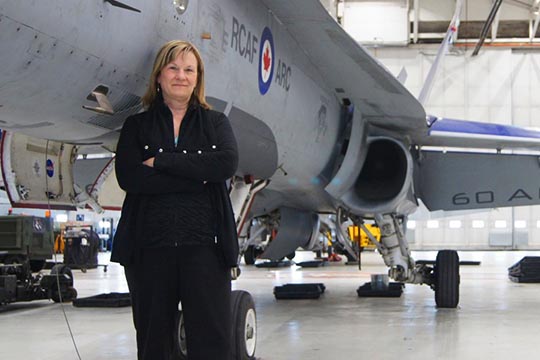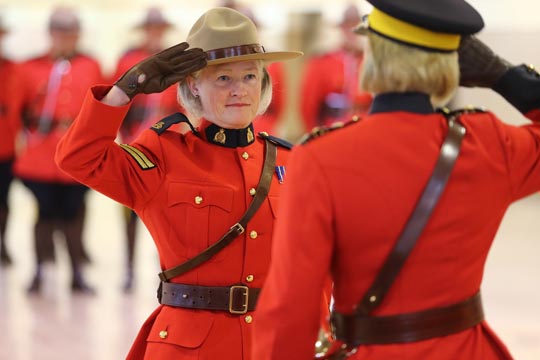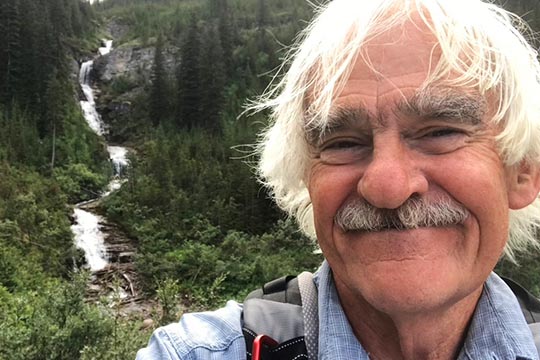
CAF veteran Dr. Karen Breeck has taken some important lessons from two decades of military service, including how fortunate we are to be Canadian.
“I remember hearing stories from astronauts about that life-altering moment when they first looked down at the Earth from space. They realized just how small, interconnected and borderless everything looks from that height,” remarked Canadian Armed Forces (CAF) veteran Dr. Karen Breeck who focused on the provision of aerospace medical care and support during most of her career. “I think that experience could be compared to a Canadian soldier in a far-away, war-torn or disaster-struck country who realizes in those moments just how interconnected we all are and just how precious that Canadian flag is that sits on your shoulder so proudly.”
Veterans’ Week, including Remembrance Day on Nov. 11, offers Canadians an opportunity to reflect on our military history and to recognize the sacrifices of the women and men who have served our country. Join us as we sit down (virtually) with three amazing Canadian veterans – Dr. Karen Breeck, Roy Goodall and Jane Hall – to talk about their careers and the significance of remembrance.
Valuing community service
Roy Goodall, CAF veteran and vice-president of Federal Retirees, spent 36 years as a communications and electronics officer before retiring to pursue a second career as a self-employed financial planner. For Goodall, his military career taught him the value and importance of community service. “There are too many things that would never get done without volunteers,” he explained. “Children would not play organized sports without the assistance of volunteers, community events and social programmes such as food banks would simply not be successful.”
In addition to bolstering communities, Goodall also reminds us that volunteerism aids those who need help getting back on their feet or overcoming trauma. Ultimately, he traces his passion for volunteerism back to “the military’s culture of looking after each other in difficult times and providing assistance to communities suffering from catastrophic events like fires and floods.”
Jane Hall, a veteran of the Royal Canadian Mounted Police (RCMP), found her career also left her with a profound belief in the value of helping others. “The extraordinary powers granted by Canada to police and military are most powerful when they are used to keep people safe and help others receive the support so many Canadians take for granted,” she said. Ultimately, she looks back on her service as heartening. “During my two decades of service, I was struck by the goodness and decency of people.”

This photograph is especially significant to RCMP veteran Jane Hall – it was taken at the RCMP graduation of her daughter, Katherine.
Appreciating peace
Breeck remembers her career as challenging, rewarding and unpredictable, where no two days were quite alike. She completed 20 years of regular Force duties in the CAF as a medical officer (which, she points out, is fancy military speak for being a doctor). “Just as the recruiting commercials promised – there really was no life like it for the amount of adventure and variety being in the military provided me during my career.”
Reflecting on her work, Breeck notes in particular her time as a peacekeeper in the late 1990s for the UN Disengagement Observer Force (UNDOF) located in Israeli occupied Syria. “It was still a fairly unusual thing to be a female officer on a peacekeeping mission back then,” she observed. (In fact, she was the only one among the more than 1,500 troops supporting the mission!) “To be a Canadian, wearing a UN blue peacekeeper beret and helmet standing alongside Polish and Austrian soldiers in support of peace was one of my proudest military moments.”
This career highlight, among many, many other experiences, has taught Breeck “how rare and special it is to live in a peace-filled nation, where everyone is freely and safely able to vote.” In that way, she considers Veterans’ Week to be an important time not only to remember the sacrifices of those who served our country but also to reflect on how lucky we are to live in Canada, in peace. “I realized that I literally had already won the lottery of life the day I was born in Canada,” Breeck affirmed.
Taking part in remembrance
When we asked three veterans about the meaning of Veterans’ Week we received, as you might have guessed, three different – and compelling – answers. Goodall emphasized that Veterans’ Week can be a time to take action and help veterans who may be struggling. “A good way for Canadians to honour veterans is to support organizations assisting physically and mentally disabled veterans in their communities.” He was also quick to point out that employers have a role to play in helping those who may be transitioning out of military service. He urged companies and businesses to support Canadian veterans by “recognizing the value of their unique military education, culture and skills when they apply for work.”

For CAF veteran Roy Goodall (pictured during a recent hike at Mount Bourgault in Banff National Park), his military career has inspired him to keep giving back to Canadians through volunteerism.
For Hall, Veterans’ Week is about remembering the stories of those who served and keeping them alive in our hearts and minds. She thinks of her great uncle, Tilley Koen, who was too old to serve in the First World War but who somehow managed, through dedication and enthusiasm, to enlist anyway. Hall also makes sure to teach her own children about their grandfather, John Hall, who, rather than learning to drive in his mother’s Honda Civic as a teen today might, practiced his driving skills “as a tank driver in the Canadian Fifth Armoured Division at the age of 16 during the Second World War.”
Hall is deeply moved by the bravery and sacrifices of Tilley Koen and John Hall, and she finds that fostering meaningful emotional connections to those who served is an important aspect of remembrance. “The memories of past sacrifice and service have not faded because the emotions haven’t.”
In addition to taking action to support veterans and connecting meaningfully with personal stories of military service, Breeck asks Canadians to do one more thing: “I would challenge everyone who doesn’t do so already, to spend a few minutes researching a bit more about the past world wars, civil unrests, conflicts and the roles of the Canadian Armed Forces and the people in it, women and men.”
Many Canadians have lived their entire lives in peace, never knowing war, but “that history of peace is not something to be taken lightly or for granted,” Breeck asserted.
Part of honouring those who have defended our rights and freedoms is appreciating the value – and cost – of peace. Breeck encourages Canadians to consider the famous words of General Douglas MacArthur, “The soldier above all others prays for peace, for it is the soldier who must suffer and bear the deepest wounds and scars of war.”

